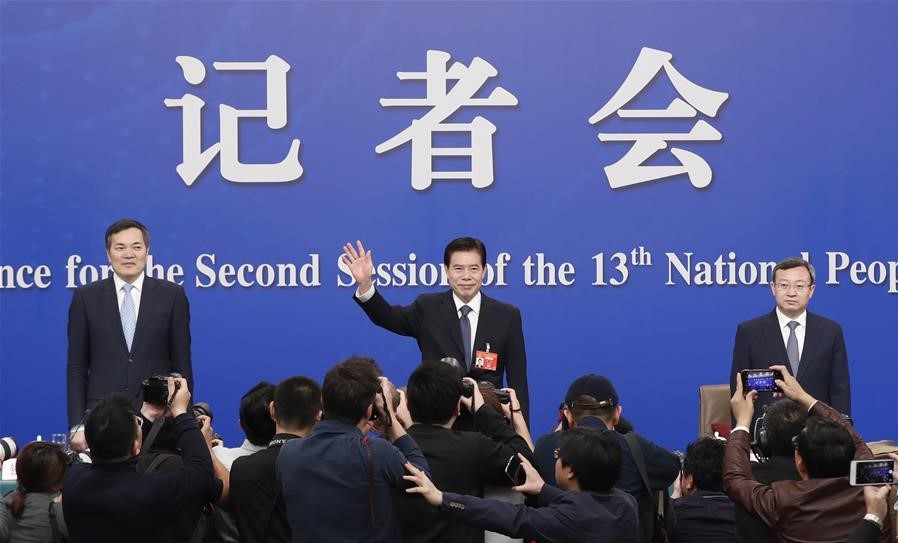Media Report

- The Washington Post reports, "The Trump administration is increasingly concerned about prospects for a trade deal with China, amid an unexpected reshuffling of the Chinese negotiating team and a lack of progress on core issues since the Group of 20 summit in Japan, according to U.S. officials and senior Republicans briefed on the discussions. Commerce Minister Zhong Shan, regarded by some White House officials as a hard-liner, has assumed new prominence in the talks, participating in a Tuesday teleconference alongside Chinese Vice Premier Liu He, who has headed the Chinese trade team for more than a year. Hopes for a deal also have been dented by China's failure to make large new purchases of U.S. farm products — despite President Trump's claim at the G-20 that Chinese President Xi Jinping had agreed to place such orders 'almost immediately' — and the lack of any announced schedule for the next round of direct talks."
- The Washington Post reports, "Taiwanese President Tsai Ing-wen departed Thursday for a four-country state visit to the Caribbean with stops in the United States on the way there and back. Her delegation is going to Haiti, St. Kitts and Nevis, St. Vincent and the Grenadines and St. Lucia on a 12-day trip. The island nations are among the few that recognize Taiwan instead of China. Tsai said that she wants to share the values of democracy and perseverance with Taiwan's friends. 'Our democracy has not come easily and now is facing the threat and technological penetration of foreign forces,' she said, in a veiled reference to China. Tsai will also make what her government is calling 'two-evening transit stops' in the United States. Taiwan does not have diplomatic ties with the United States, but the U.S. provides the self-governing island with military and other support. China objects to such support as an interference in what it considers its internal affairs."
- The New York Times reports, "A group of 22 countries has issued a statement urging China to stop the mass detention of ethnic Uighurs and other Muslims in its western Xinjiang region, the first concerted international challenge to a policy China has vigorously defended at the United Nations. In a letter to the United Nations High Commissioner for Human Rights, Michelle Bachelet, the states told China to uphold its own laws and international obligations, and stop arbitrary incarceration of Uighurs and other Muslim and minority communities, and permit freedom of religion. The letter was delivered Monday and publicly seen on Wednesday. Britain, France and Germany were among 18 European countries that, joined by Japan, Australia, Canada and New Zealand, drew attention to reports of large-scale arbitrary detentions and asked Ms. Bachelet to keep the Human Rights Council regularly updated on developments."
Calendar
- 2019-07-10 Lighthizer, Mnuchin spoke with Chinese Vice Premier Liu He on Tuesday
- 2019-07-09 U.S., China Tentatively Move to Revive Trade Talks
- 2019-07-08 Hong Kong Protesters Take Their Message to Chinese Tourists
- 2019-07-07 That New Consensus on China? It's Wrong
- 2019-07-04 Trump Is Losing His Trade Wars
- 2019-07-03 China Snares Tourists’ Phones in Surveillance Dragnet by Adding Secret App
- 2019-07-02 Li Keqiang, Chinese Premier, Reaches Out to Trump and Business
- 2019-07-01 U.S.-China Trade Talks Are Back On but Obstacles Remain
- 2019-06-28 As Trump and Xi Talk Trade, Huawei Will Loom Large
- 2019-06-27 Huawei Hits Back at Claims It Steals Secrets
News
- The Washington Post Trump team fears new face on China trade team signals tougher stance
- The Washington Post Taiwan president heads to Caribbean with US stops
- The New York Times China Rebuked by 22 Nations Over Xinjiang Repression
- The Wall Street Journal China Stirs Suspicion With Unusual Maritime-Threat Alert
- The New York Times China and U.S. Differ Over Agricultural Purchases Trump Boasted About
- Reuters China's top official in Hong Kong says Beijing backs city's leader
- Bloomberg China Is Winning the Silent War to Dominate the South China Sea
- NPR Ex-State Department Worker Gets 40 Months In Prison For Secret Dealings With China
- The Washington Post The Philippines sided with China after a boat was rammed. Critics say it's all about money.
- CNBC Trump used 'innuendo and assumption' to claim that Huawei is a security risk, says Yale's Stephen Roach
- Bloomberg China's Brightest Grads Find High-Paying Jobs Harder to Land
- Reuters China's ZTE follows Huawei with Brussels cybersecurity lab
- TIME Foxconn Founder Terry Gou Wants to be Taiwan's President—and a Go-Between for U.S. and China
- Bloomberg China Is Stifling Its Own Movie Business
Commentary
- Foreign Affairs The Right Way to Deal With Huawei
- The Wall Street Journal People Power, Hong Kong-Style
- Foreign Policy Xi Jinping Is Tsai Ing-wen's Best Poster Boy
- Bloomberg Pigs Will Fly Before China Solves Pork Inflation
- The Diplomat Understanding the US-China Trade Disconnect
- Bloomberg In China, Censors Are Hollywood's Best Friends